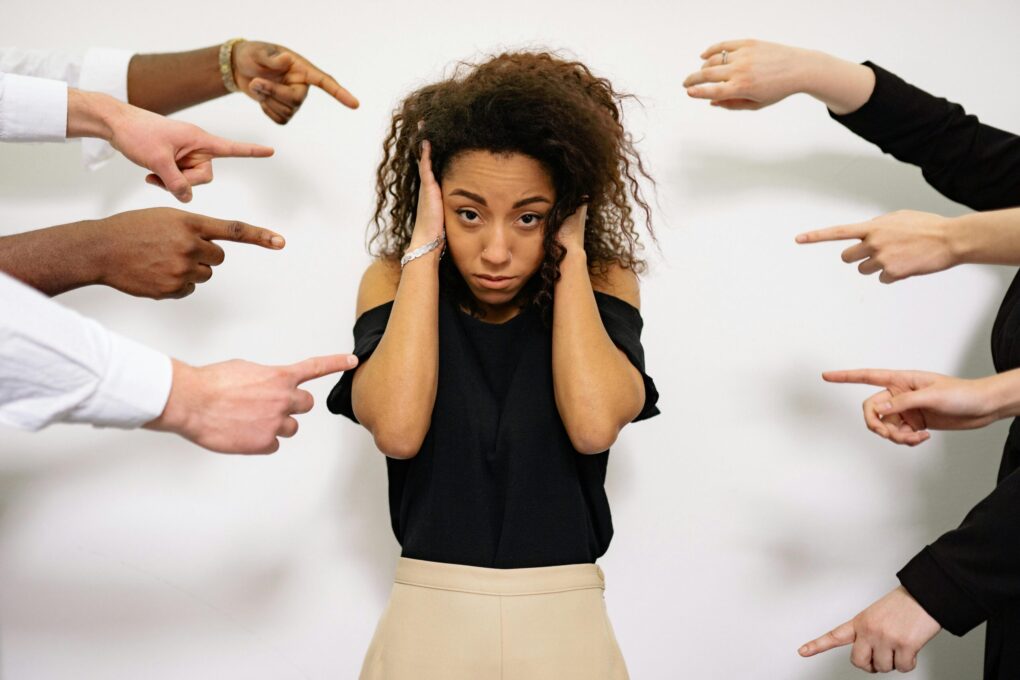Claire is a bright, caring woman who is full of potential, but her life has not been easy. She has lost a job unexpectedly, endured more than one toxic relationships, and feels the weight of financial instability. For Claire, she feels as if life is working against her, that she is playing a game where the rules keep shifting unfairly. “Why does this always happen to me?” is her mantra, and that she just can not catch a break. Rather than taking action, Claire seems more focused on the unfairness of her life rather than finding solutions.
What is the Victim Mentality?
Also known as victimhood, at its core, the victim mentality is a perspective through which someone views themselves as the constant underdog, feeling repeatedly harmed or oppressed by outside forces beyond their control. The victim mentality is the mental and emotional state where one feels powerless and blames external circumstances for one’s struggles, often without seeking solutions or accountability. People with this mindset often feel that they have no power to change their circumstances and focus on what’s wrong rather than what could be done to improve things. In psychology, the victim mentality can stem from past traumas, societal pressures, or reinforced beliefs that we lack control over our lives. Sykes (1992) discussed how a child experiencing helplessness and suffering can lead to the emergence of a sacrificial mentality characterized by the need for compassion, revenge, sympathy and a sense of undeserved resentment.
You can see this mindset manifesting in:
- Blaming others or external events for personal failures or disappointments; a sense of world injustice
- Feeling a sense of entitlement for sympathy and special treatment due to perceived hardships.
- Believing that life is inherently “unfair” and directed specifically against oneself.
- Exaggeration of harm to yourself in various situations, even going as far as to catastrophize the harm or situation complexity (Aquino & Byron, 2002)
- Dwelling on past negative experiences as proof that nothing will ever go right.
- Accusing others of creating the situations that the victim had to work hard to compensate for the damage (Aquino & Byron, 2002)
- Feeling unworthy of well-being and having good things happen to them (Andronnikova & Kudinov, 2021)
- Having a fixed negative idea of yourself that you are incapable of protecting yourself (learned helplessness) (Andronnikova & Kudinov, 2021)
Why Do We Stay in the Victim Mentality?
Even when this mentality causes people pain, people still cling to the victim mentality because it:
- Avoids taking Responsibility: By believing our issues stem solely from external sources, we avoid the daunting task of self-reflection or change.
- Provides Protection Against Further Hurt: Feeling like a victim can create a protective emotional wall. If we assume that things will always go wrong, we’re not as vulnerable to disappointment.
- Allows Us to Receive Sympathy: People are often sympathetic to those in pain, and sometimes this support can become a comforting source of validation. We can become addicted to the sympathy.
- Reinforces Our Identity: For some, victimhood becomes a core part of their identity. It can offer a sense of purpose or belonging, especially in communities or friendships built around shared hardships. If you were to let go of those hardships – e.g.: if you were to let go that you are always the victim – you have limited to or no connection to those in your community.
This state of mind traps people in an endless loop of helplessness, which often deepens their dissatisfaction in life and themselves.
Are You Really a Victim or Are You Manipulating?
There are certainly times when the victim mentality is not only understandable but entirely valid:
- After a Traumatic Event: Trauma can leave individuals genuinely helpless and struggling. Recognizing one’s victimhood here is often the first step toward healing.
- When Facing Unjust Systems or Situations: In situations where people are systematically oppressed, marginalized, or unfairly treated, recognizing oneself as a victim of these forces is a natural reaction and can be a catalyst for advocacy and change.
But there’s a crucial distinction: staying in a place of victimhood indefinitely or using it to avoid responsibility may start to hinder one’s growth. A healthy approach is recognizing when victimhood serves a purpose (healing or advocating for change) versus when it is a crutch for stagnation.
Is the Victim Mentality the Same as Feeling Sorry for Yourself?
No, but they are related. Feeling sorry for oneself is an emotion, often short-lived and tied to specific circumstances, while a victim mentality is a mindset—a persistent outlook. When we feel sorry for ourselves, it’s a signal of pain or dissatisfaction, which can motivate us to seek comfort, compassion, or change. The victim mentality, however, is a habitual way of thinking that often resists action and holds onto past grievances.
How Can You Break Free from the Victim Mentality?
- Practice Self-Awareness: Acknowledge when you feel powerless and examine why. Are there recurring thoughts or triggers that lead you to feel victimized?
- Shift from Blame to Accountability: Taking accountability doesn’t mean blaming yourself; it means recognizing where you have power and what steps you can take.
- Challenge Limiting Beliefs: If you’ve held onto beliefs like “Life is always against me” or “I can’t change anything,” try to replace these with more empowering thoughts, like “I can handle challenges” or “I have some control over my responses.”
- Seek Purpose Beyond Pain: Rather than dwelling on what’s gone wrong, focus on where you want to go and what you can build moving forward.
- Consider Professional Support: Working with a therapist or counselor can help uncover any deep-seated reasons for feeling powerless, and guide you toward resilience and growth.
Moving beyond a victim mentality isn’t about ignoring or invalidating the pain of real trauma and hardship. Instead, it’s about recognizing when the identity of “victim” no longer serves you, when it’s time to embrace an identity that empowers growth and self-compassion.
References
Aquino, K., & Byron, K. (2002). Dominating interpersonal behavior and perceived victimization in groups: Evidence for a curvilinear relationship. Journal of Management, 28(1), 69–87. https://doi.org/10.1177/014920630202800105
Andronnikova, O., & Kudinov, S. (2021). Cognitive attitudes and biases of victim mentality. Changing Societies & Personalities, 5, 654–668.
Discover more from My Divine Shadow
Subscribe to get the latest posts sent to your email.



